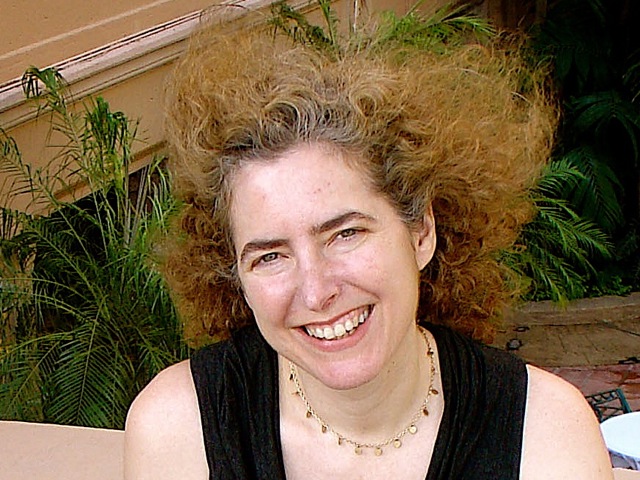
reference-image, l
(article, Ivy Manning)
[%pageBreakSettings nobreak=true] [%adInjectionSettings noInject=true] p(blue). Drawing on her experience growing up in a multicultural family, Diana Abu-Jaber spins tales of love, identity, and good food with her vivid, dreamlike prose. She is the author of several novels, including the thriller [%bookLink code=0393064557 Origin], the memoir The Language of Baklava, and the award-winning novel [%bookLink code=0393325547 Crescent]. Her nonfiction work has appeared in the New York Times, Vogue, Gourmet, and Saveur. In Crescent, your protagonist is a chef. In The Language of Baklava, you recount your childhood through dishes your Jordanian father cooked. And in Origin, your heroine finds solace in the warmth of loaves of fresh bread. Food finds its way into much of your writing. Have you ever considered becoming a chef? Oh yes, I worked as a cook throughout college and for a few years after. I started as a line cook at a charming place called The Char Pit and worked up to short-order cook at a Sambo's, among many other delightful spots. I loved to cook, but I finally realized I was exhausted all the time. It dawned on me that I was better suited to writing about food instead of actually preparing it. Your memoir is called The Language of Baklava. Is there a language spoken by food? Yes, it's the language of something tasting really good. And it doesn't matter what country it's from, or whose culture invented it, or what the politics of the chef are, or what the religious beliefs of the people at dinner are. You can all just immediately connect and recognize good food for what it is: the transcendental, unifying beauty of delicious things. [%image diana float=left width=250 caption="Diana Abu-Jaber" credit="Photo: Scott Eason"] Your father is Jordanian and your mother American. Do you see a difference in the way each side of your family sits down to eat? My mom always seemed like the quintessential product of American techno-foods. She liked things like brown-in bags, Hamburger Helper, and TV dinners. She actually is a fairly good cook, but she's always worked, so I think she felt too swamped to do much with it. Dad, on the other hand, has always loved the kitchen. To him it's all about nurturance and connection to the women in his family, as well as connection to his native culture. During the weekends, Dad did the cooking; we often had relatives or other visitors over, and we sat at the big dining-room table and meals were much more elaborate and leisurely, extending over entire afternoons. The world is getting smaller: supermarkets carry hummus, "kabob" is a common word in English, and the Food Network is exposing millions of Americans to a wide array of cuisines. What's your take on the globalization of American palates? I grew up in a more-or-less globalized household. I don't think that mixing cultures has to make food styles any less "pure" or in any way "weakens" traditions. In fact, most of the great foods that we love are the result of cultural cooperation — like baklava, which has elements of Greek, Turkish, and Arabic cuisines. Of course, if you're talking about importing Honduran tomatoes to Wisconsin in the middle of February, which is a more political and economic form of globalization, that's not good. It's better to learn how to make something like a curry or stir-fry by improvising with fresh local ingredients and benefit from the creative fusion. [[block(sidebar). h1.Featured recipe]] Your most recent novel, Origin, is a thriller about a fingerprint expert living in the frozen tundra of Syracuse, New York. Did you consciously decide to step away from writing about food and the Arab-American experience? I love testing myself and pushing my writing, to see what I can make it do. Whether it's food or writing or any kind of creative endeavor, I just think it's very natural to want to bust out of old places and keep recreating yourself. For example, my next book, a young-adult novel called Silver World, features a young Arab-American girl, but it's a fantasy, so it's an entirely new genre for me once again. What's your most recent cookbook purchase? [%bookLink code=030726498X Arabesque], by Claudia Roden. And what's the most stained, dog-eared, well-loved cookbook in your kitchen? My most relied-upon and most beloved is James Beard's American Cookery. Oh, and The Silver Palate Cookbook and The New Moosewood Cookbook. Name some favorite authors who write about food in a way that inspires you. Too many to name! I love M. F. K. Fisher, Laurie Colwin, Brillat-Savarin, Ruth Reichl, and also Jonathan Gold, a food critic for Gourmet and the LA Weekly._ What's for dinner at your house tonight? Tonight is very simple: pork loin on the grill with adobo sauce, asparagus and zucchini salad, quinoa with raisins and toasted almonds. Oh, and peach cobbler for dessert, mm! p(bio). Ivy Manning is a food journalist and cooking instructor in Portland, Oregon. She is the author of The Farm to Table Cookbook.

reference-image, l

promo-image, l

diana, l